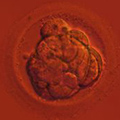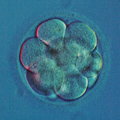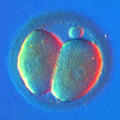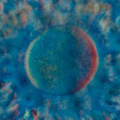OGS 24 Chromosome Aneuploidy Screening

Oligonucleotide Genome Screening of 24 Chromosomes (OGS-24) is a new technology developed at ViaGene in 2010. With OGS-24 our lab can test all 24 human chromosomes for aneuploidy. Due to the complexity of the procedure, at this time OGS-24 is only offered for the IVF Centers in the Greater Los Angeles area. The other services are available to IVF clinics throughout the United States, Canada and Mexico.
Who should consider using OGS-24?
Any couple going through IVF can benefit from OGS-24, however it is a particularly beneficial procedure to the patients of the advanced maternal age (AMA) and to the couples experiencing Recurrent Pregnancy Loss (RPL). RPL is sometimes the result of an inherited condition from one of the parents, such as translocation or a single-gene disorder. However, according to the American Society of Reproductive Medicine (ASRM) 60% or more of early miscarriages may be attributed to random chromosome abnormalities such as chromosomal monosomy or trisomy. Please refer to our Aneuploidy Section for more information.
With OGS-24 every chromosome of each available embryo will be analyzed for monosomy or trisomy to assure that the embryo transferred is genetically normal.
Advantages of OGS-24
Currently, there are several PGD technologies available for screening the complete set of human chromosomes. These include CGH, aCGH//SNP Microarray methods, and OGS-24. Out of these only OGS-24 does not require whole genome amplification (WGA). Both SNP and CGH methods are reliable and accurate, however, because at a first step both of them rely on PCR, their accuracy may be compromised. Problems such as preferential amplification during WGA and sample contamination with extragenous DNA may lead to "no results" or "low confidence" PGD results. OGS-24 is equally accurate, but because it does not rely on WGA as its first step, it does not suffer from the same "no result" issues. However, OGS-24 is more expensive and currently only available to clinics in the greater Los Angeles Area.
OGS-24 ALWAYS gives results. If an embryo Biopsy is performed by our staff, we know it on-site that the biopsied cell had a nucleus and that the embryo will have 100% accurate PGD result. On the other hand, if an anucleate cytoplasmic "bleb" was biopsied (normally resulting in "No Signal//No Intact DNA in the Tube" report from microarray-based PGD Lab 24 hrs later), we know it on-site and the second biopsy is immediately performed.
At ViaGene, when we do 24-chromosome aneuploidy testing for the IVF Centers concerned with embryo mosaicism, we offer Day 4 biopsy of two cells from the opposite sides of the morula. This is less damaging than taking 5-10 cells at the blastocyst stage one day later and also offers a better chance of detecting mosaicism than any other PGD technique.






